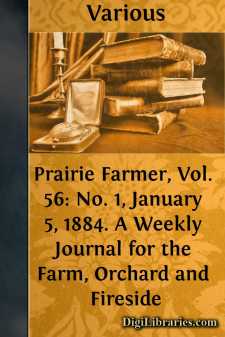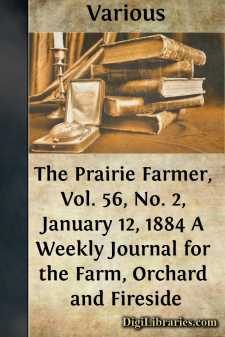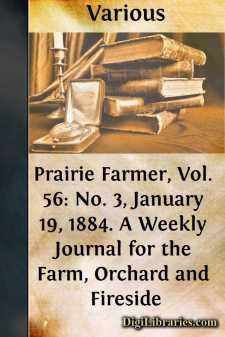Categories
- Antiques & Collectibles 13
- Architecture 36
- Art 48
- Bibles 22
- Biography & Autobiography 813
- Body, Mind & Spirit 142
- Business & Economics 28
- Children's Books 17
- Children's Fiction 14
- Computers 4
- Cooking 94
- Crafts & Hobbies 4
- Drama 346
- Education 46
- Family & Relationships 57
- Fiction 11829
- Games 19
- Gardening 17
- Health & Fitness 34
- History 1377
- House & Home 1
- Humor 147
- Juvenile Fiction 1873
- Juvenile Nonfiction 202
- Language Arts & Disciplines 88
- Law 16
- Literary Collections 686
- Literary Criticism 179
- Mathematics 13
- Medical 41
- Music 40
- Nature 179
- Non-Classifiable 1768
- Performing Arts 7
- Periodicals 1453
- Philosophy 64
- Photography 2
- Poetry 896
- Political Science 203
- Psychology 42
- Reference 154
- Religion 513
- Science 126
- Self-Help 84
- Social Science 81
- Sports & Recreation 34
- Study Aids 3
- Technology & Engineering 59
- Transportation 23
- Travel 463
- True Crime 29
Sort by:
by:
Various
MR. PUNCH'S PRIZE NOVELS. NEW SERIES.—IMPORTANT ANNOUNCEMENT. This age has been called an Age of Progress, an Age of Reform, an Age of Intellect, an Age of Shams; everything in fact except an Age of Prizes. And yet, it is perhaps as an Age of Prizes that it is destined to be chiefly remembered. The humble but frantic solver of Acrostics has had his turn, the correct expounder of the law of Hard...
more...
by:
Various
HOW IT'S DONE. A Handbook to Honesty. No. 11.—THE STRAIGHT "TIP." SCENE—Sanctum of "Large Wholesale House." Present, one of the Principals, a pompous personage, with imposing watch-chain, and abundant space for it to meander over, and a sleekly subservient "Head of Department." Principal looks irritated, Head of Department apprehensive, the former angrily shuffling some...
more...
by:
Various
CHAPTER I. It was evening—evening in Oxford. There are evenings in other places occasionally. Cambridge sometimes puts forward weak imitations. But, on the whole, there are no evenings which have so much of the true, inward, mystic spirit as Oxford evenings. A solemn hush broods over the grey quadrangles, and this, too, in spite of the happy laughter of the undergraduates playing touch last on the...
more...
by:
Various
Mr. Punch, on the strength—or, rather, length—of a Message from President Pierce, visited her Majesty Queen Mab. He was received by a most courteous Dream-in-Waiting, who introduced him through the Gate of Horn, whence, as Colonel Sibthorp beautifully remarks,"Veris facilis datur exitus Umbris."Dream-World was merrily keeping its Yule-tide, with shadowy Sports and dissolving Pastimes. As...
more...
by:
Various
MODERN TYPES. (By Mr. Punch's Own Type Writer.) No. XIX.—THE SERVANT OF SOCIETY. The Servant of Society is one who, having in early life abdicated every claim to independent thought or action, is content to attach himself to the skirts and coat-tails of the great, and to exist for a long time as a mere appendage in mansions selected by the unerring instinct of a professional tuft-hunter. It is...
more...
by:
Various
MODERN TYPES. (By Mr. Punch's own Type Writer.) No. XVIII.—THE UNDOMESTIC DAUGHTER. The race of daughters is large, but their characteristics, vocations, and aptitudes, are but little understood by the general public. It is expected of them by their mothers that they should be a comfort, by their fathers that they should be inexpensive and unlike their brothers, and by their brothers that they...
more...
by:
Various
INTRODUCTION. This collection of epitaphs was started in a very modest fashion about thirty-five years ago, when the compiler found great pleasure in searching all the graveyards near her Vermont home for quaint inscriptions upon old tombstones. It was neither a morbid curiosity nor a spirit of melancholy that attracted her to the weather-beaten slabs of marble and slate, but rather a fondness for...
more...
by:
Various
Prof. John W. Robson, State Botanist of Kansas, sends The Prairie Farmer an extract from his last report, concerning a tame grass for hay and pasturing which is new to that State. The grass has been on trial on an upland farm for two years, during which time he has watched it very closely. The Professor says, "It possesses so many excellent qualities as to place it in the front rank of all...
more...
by:
Various
Bulletin No. 6 of Missouri Agricultural College Farm is devoted to an account of experiments intended to demonstrate the relation of dew to soil moisture. Prof. Sanborn has prosecuted his work with that patience and faithfulness characteristic of him, and the result is of a most interesting and useful nature. The Professor begins by saying that many works on physics, directly or by implication, assert...
more...
by:
Various
Editor Prairie Farmer—I write you in regard to the corn question. I would like to know if angle-worms damage corn. Eight years ago I came to the conclusion that I could raise double the number of bushels of corn that I was then raising. I then commenced experimenting on a small scale. I succeeded very well for the first three or four years. I got so that I could raise over ninety bushels per acre. In...
more...











